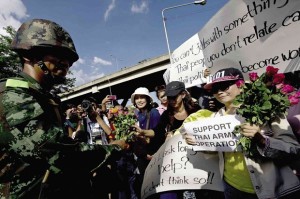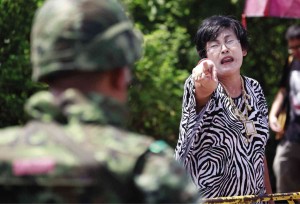OFWs staying put in Thailand

A THAI soldier (left) receives roses from activists to show support for the Thai military at the Army Club in Bangkok on May 23. Thailand’s Army said 155 prominent figures, including ousted government leaders, were banned from leaving the country without permission following a military coup. AFP
The Department of Foreign Affairs raised the alert level in Thailand from level 1 (precautionary phase) to level 2 (restriction phase) after martial law was declared in the kingdom on May 20. A military takeover was announced two days later, after months of clashes between the so-called “Yellow Shirts” or the Democrats and the “Red Shirts” or the supporters of deposed Prime Minister Thaksin Shinawatra and his sister, former Prime Minister Yingluck Shinawatra
Alert Level 2 is issued when there are real threats to the life, security and property of Filipinos arising from an internal disturbance or external threat to the host country. Under this level, Filipinos in the host country are instructed to restrict nonessential movements, avoid public places and prepare for evacuation if necessary. Also restricted is the deployment of newly hired workers, although those who have existing contracts are allowed to return.
A curfew from 10 p.m. to 5 a.m. has been imposed but private employees or government officials working night shifts in various sectors such as factories, hospitals, airlines and perishable food logistics are exempted.
Foreign workers in Thailand, including many Filipinos hope the situation will soon stabilize and there will be no need for evacuation.
Many of the Filipinos in Thailand are teachers outside Bangkok, where the effects of the political turmoil are little felt. Since most of the newscasts are in the Thai language, many Pinoys pick up news from other Filipinos via Facebook.

A progovernment protester points at a soldier during a cleanup at a progovernment demonstration site on the outskirts of Bangkok, Thailand, Friday, May 23. Thailand’s ruling military on Friday summoned the entire ousted government and members of the politically influential family at the heart of the country’s long-running conflict, a day after it seized control of this volatile Southeast Asian nation in a nonviolent coup. AP
Reuben Hilario, a lecturer in a university in Phitsanulok, a province in northern Thailand, said nothing had changed in his work situation. “My university has not warned or issued anything for the foreign lecturers here regarding this matter.”
Many Filipinos are keen on just staying put. Diego Paradero, another teacher in Phitsanulok quipped: “Even if there is martial law in Thailand, we have work, unlike in the Philippines, there is no martial law but we don’t have work.”
“Life here is going on normally except that men in uniform are quite visible now,” said Lorenzo Caballes, a high school teacher who has been in Thailand for three years.
Carl Abelard Garcia, an OFW in Thailand for seven years who has observed the changing political landscape for quite some time, believes there will be no need for evacuation.
Joma Cordova, a lecturer in a university in Korat, remembers a violent clash in 2010 when the Red Shirts and government troops clashed on the streets of Bangkok. For him, the implementation of martial law could preempt another bloody clash.
Prime Minister Yingluck Shinawatra stepped down on May 7, after the Thai Court ordered her out for abuse of power.